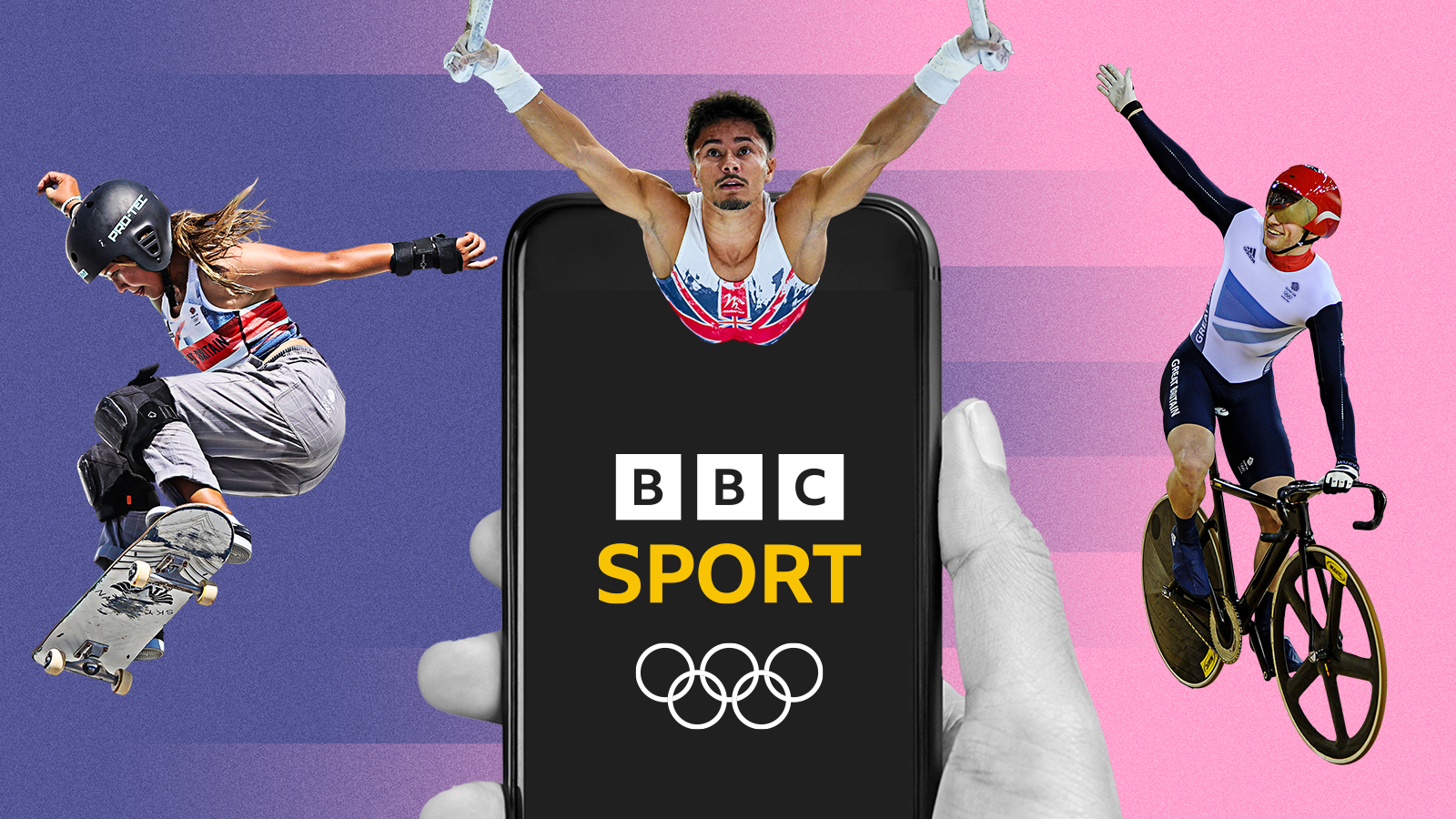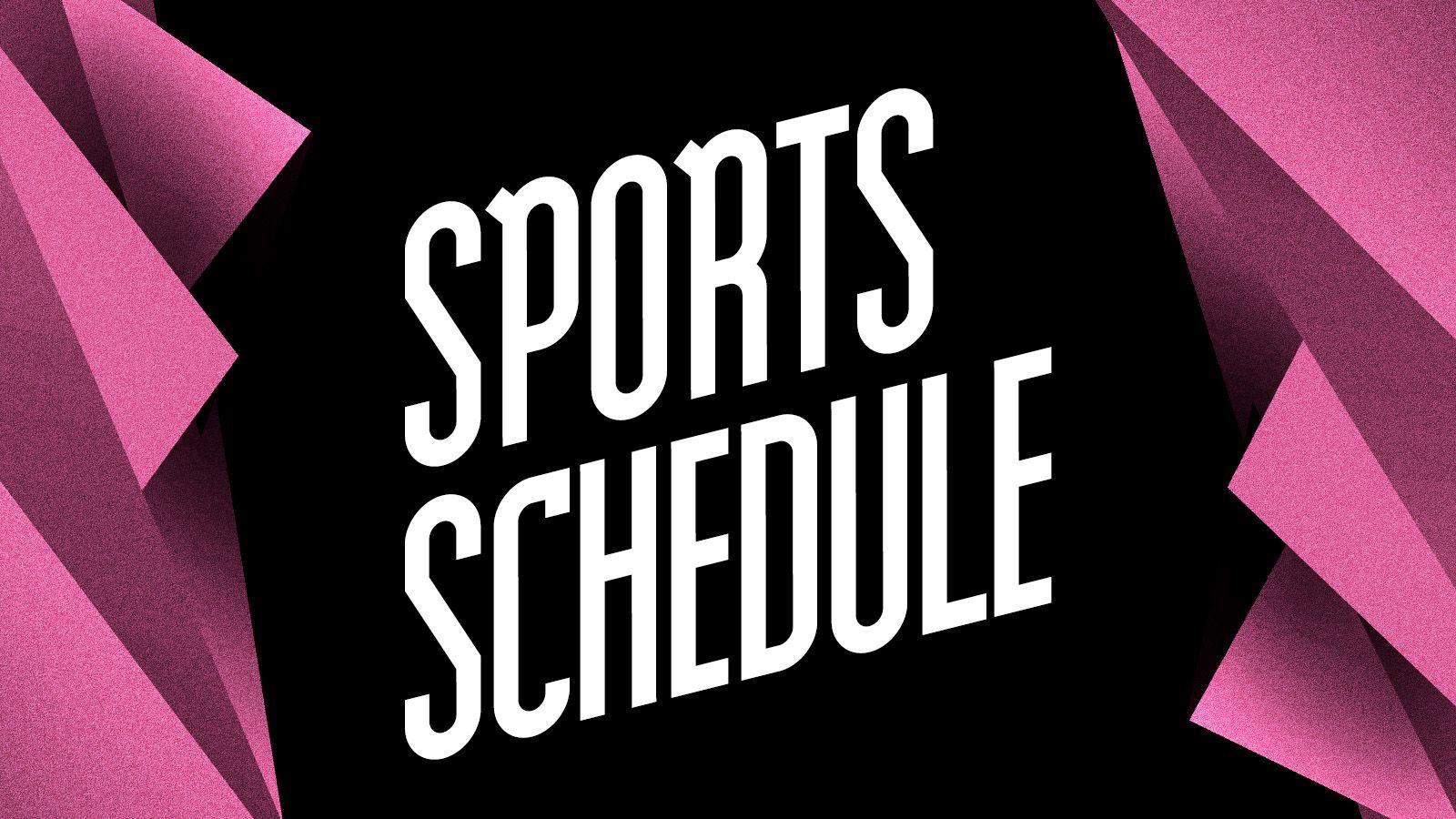Boxing's gender row - what's going on and are Russia involved?
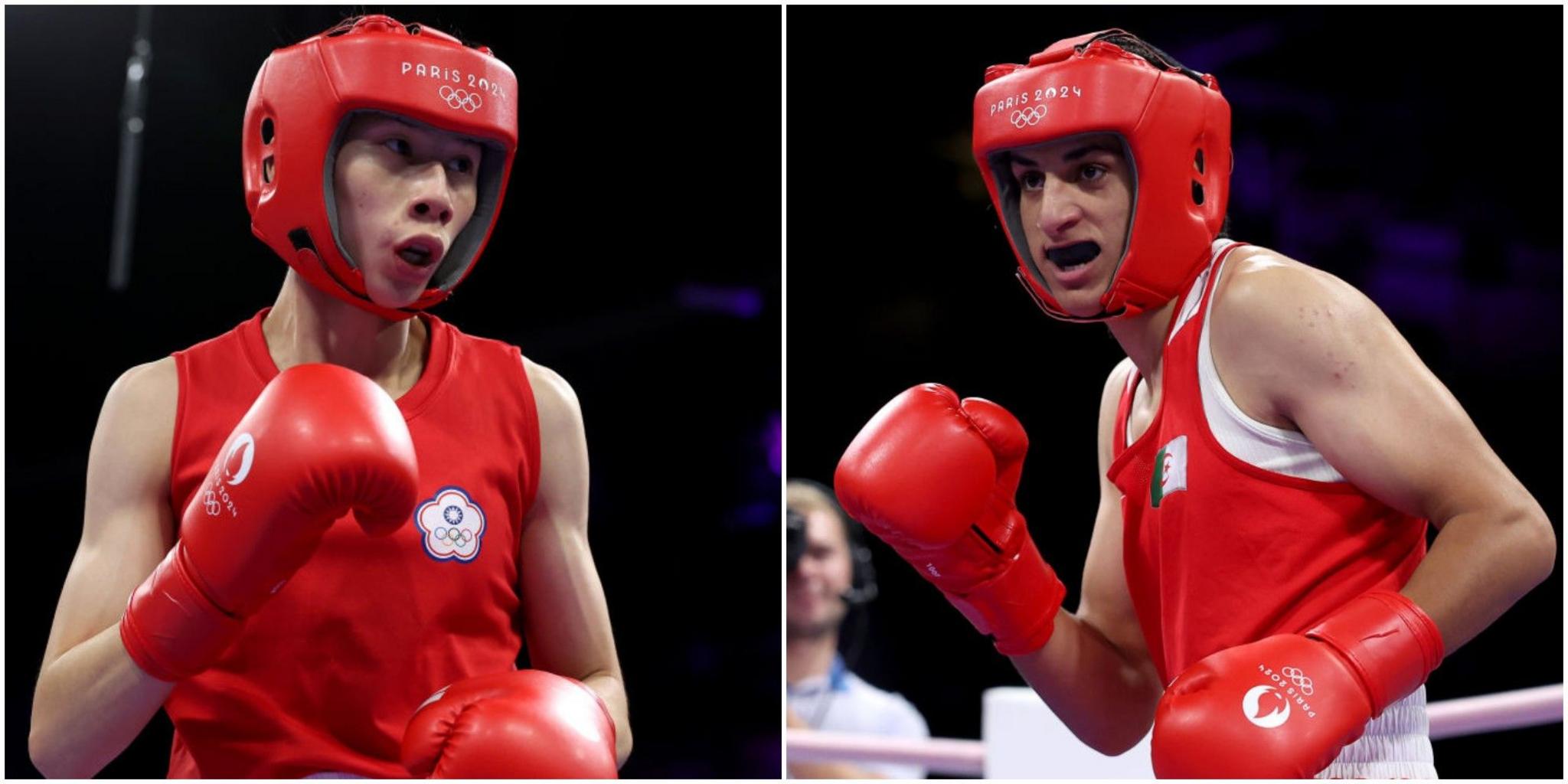
Lin Yu-ting and Imane Khelif are guaranteed a medal at Paris 2024
- Published
Boxing at Paris 2024 has been overshadowed by a row about the eligibility of two fighters in the women's competition.
Algeria's Imane Khelif and Taiwanese fighter Lin Yu-ting will fight for gold on Friday and Saturday respectively.
But last year they were disqualified from the World Championships.
The body that oversaw that 2023 event is the International Boxing Association (IBA), and it says both fighters failed gender eligibility tests.
On Monday the IBA held a news conference which it had said would provide a "detailed explanation of the reasons for the disqualification".
However the chaotic media event left more questions than answers.
The International Olympic Committee (IOC) has cast doubt on the reliability of the tests and suggested what is happening is a "sometimes politically motivated cultural war".
In June 2023, the IOC stripped the IBA of its status as the sport's amateur world governing body over concerns over how it was run.
So, what is going on?
IBA holds chaotic news conference on Olympic boxing row
- Published5 August 2024
What is the IBA?
The IBA, formerly known as AIBA, was formed in 1946 as a worldwide governing body for amateur boxing. The IOC recognised the IBA as the sport's governing body until 2019.
Why did the IOC stop recognising the IBA?
The IOC suspended the IBA in 2019.
This was because of governance issues and alleged corruption.
It led to the threat that boxing would be removed from the Olympics altogether from 2028.
What were some of the concerns?
In 2018, the IBA issued life bans to ex-president CK Wu and former executive director Ho Kim after a report documented "gross negligence and financial mismanagement of affairs and finances".
Wu had been in charge for 11 years before being provisionally suspended in October 2017.
Wu was replaced as AIBA president by Gafur Rakhimov, who was described by the US Treasury Department as "one of Uzbekistan's leading criminals".
In 2020, Russian Umar Kremlev was elected president.
In 2022, an independent investigation said boxing needed to take action on ethical issues to secure its Olympic future, having found a "historical culture of bout manipulation" - including at the 2016 Rio Games.
In his final report, Professor Richard McLaren detailed decades of financial mismanagement and deception, rule-breaking in the ring, and inadequate training and education programmes for referees, judges and officials.
Who is IBA president Umar Kremlev?
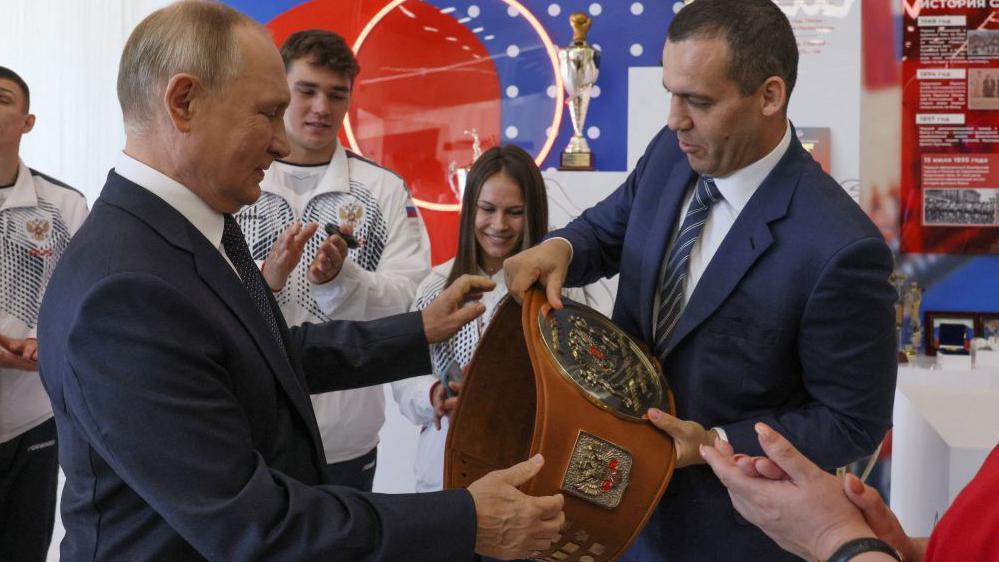
Kremlev pictured with Russian President Vladimir Putin at the country's newly opened international boxing centre in September 2022
Kremlev is seen as having close ties to the Kremlin. Under his leadership, the IBA has had Russian state-backed energy giant Gazprom among its chief sponsors.
In May 2022, Kremlev was re-elected unopposed after Dutch boxing federation president Boris van der Vorst was declared ineligible.
The Court of Arbitration for Sport (Cas) later said Van der Vorst was wrongly prevented from standing, but a proposal to stage a new election was rejected by IBA delegates.
The IOC said it was "extremely concerned" by the result, and Van der Vorst said he feared for the sport's Olympic future.
What was the background to the 2023 IBA World Championships?
The 2023 World Championships were held in two countries. The women's event was in India in March, and the men's in Uzbekistan in April and May.
A total of 19 countries, including Great Britain and the USA, boycotted the events after the IBA allowed Russian and Belarusian boxers to compete under their countries' flags, contravening IOC guidance following the invasion of Ukraine.
Kremlev said those boycotting the championships were "worse than hyenas and jackals" because of their violation of the "integrity of sport and culture".
At the time, GB Boxing said of its decision to boycott the championships that the flag issues had "put further distance between IBA and the Olympic movement in addition to the significant, longstanding issues over sporting integrity, governance, transparency and financial management which the IOC has asked IBA to address to protect boxing's place on the Olympic programme".
What happened at the 2023 Worlds?
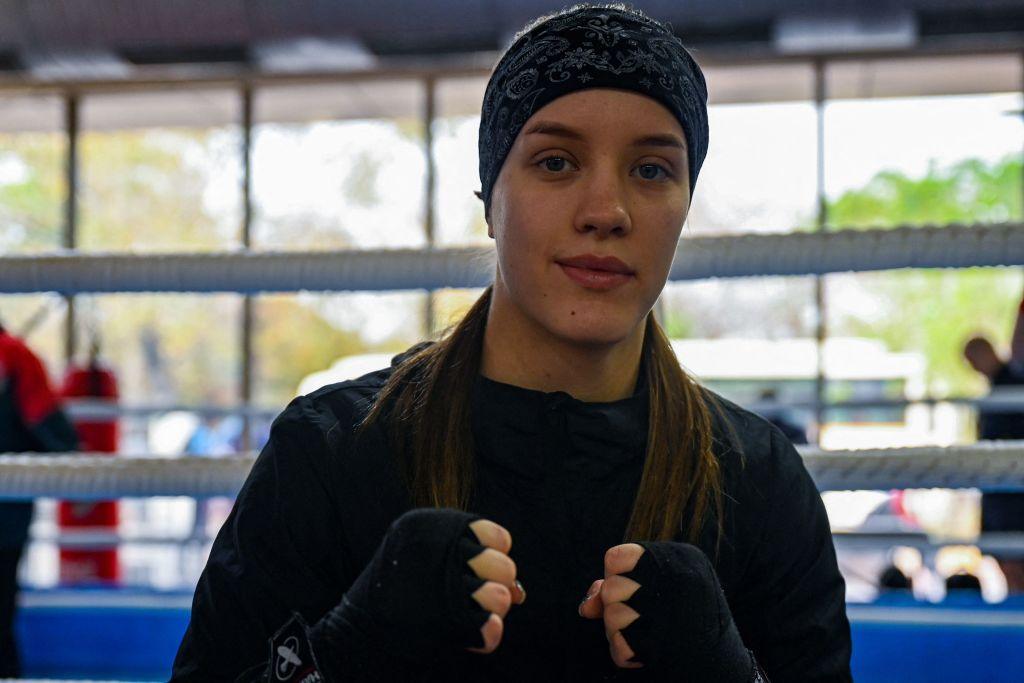
Russian athletes such as boxer Azalia Amineva are prevented from competing at Paris 2024 for their country. No Russian boxers are at the Games as neutral athletes.
At the 2023 World Championships, Khelif was competing in the welterweight category and Lin at featherweight.
Hours before Khelif's gold-medal match against China’s Yang Liu, the IBA said the Algerian had failed a gender eligibility test.
Khelif had beaten Janjaem Suwannapheng from Thailand in the semi-final, Uzbekistan's Navbakhor Khamidova in the quarter-final and Russia's Azalia Amineva in the round prior to that.
As a result of Khelif's disqualification, 21-year-old Amineva had the only loss in her now 22-fight career removed from the record.
At the same 2023 World Championships, Lin was stripped of a bronze medal by the IBA.
The IBA said the fighters had "failed to meet the eligibility criteria for participating in the women's competition, as set and laid out in the IBA regulations".
What do we know about the tests?
The BBC has, as yet, been unable to determine what the eligibility tests consisted of. It is not known how tests were overseen.
In an interview with BBC sports editor Dan Roan last Thursday, IBA chief executive Chris Roberts said male XY chromosomes were found in "both cases".
Roberts said there were "different strands involved in that" and therefore the body could not commit to referring to the fighters as "biologically male".
He said the unspecified eligibility tests had been conducted as a result of “ongoing concerns” raised by other fighters, coaches and the IBA’s medical committee.
At Monday's media event Roberts said Khelif and Lin were first tested at the 2022 World Championships in Istanbul, Turkey but no action was taken as the results were "inconclusive".
Of the fighters' 2023 disqualifications, he said: "The results of the chromosome tests demonstrated both boxers were ineligible."
But while Roberts said the pair had "chromosome tests", Kremlev appeared to suggest the tests were to determine the fighters' testosterone levels.
Testosterone is a hormone that can increase muscle mass and strength. Chromosomes carry genetic information including a person’s sex.
"We got the test results that they allowed us to make and these test results show they have high levels of testosterone, like men, said Kremlev.
He added that if boxers "want to prove they were born women, they have to do it by themselves".
The IBA said the tests were sent to two different laboratories that are accredited by the World Anti-Doping Agency (Wada).
However, Wada has told BBC Sport it does not oversee gender tests and its work only relates to anti-doping matters.
The IOC has previously raised doubts over the accuracy of the tests.
"We don't know what the protocol was, we don't know whether the test was accurate, we don't know whether we should believe the test," said IOC spokesperson Mark Adams.
"There's a difference between a test taking place and whether we accept the accuracy or even the protocol of the test."
What had been the IOC and IBA reaction to the 2023 tests at Paris 2024?
Imane Khelif: IOC responds to boxing gender controversy
In a statement lastThursday, the IOC said Khelif and Lin had been "victims of a sudden and arbitrary decision by the IBA".
"Towards the end of the IBA World Championships in 2023, they were suddenly disqualified without any due process," the IOC said.
"According to the IBA minutes available on their website, this decision was initially taken solely by the IBA secretary general and CEO. The IBA board only ratified it afterwards and only subsequently requested that a procedure to follow in similar cases in the future be established and reflected in the IBA regulations. The minutes also say that the IBA should 'establish a clear procedure on gender testing'.
"The current aggression against these two athletes is based entirely on this arbitrary decision, which was taken without any proper procedure - especially considering that these athletes had been competing in top-level competition for many years.
"Such an approach is contrary to good governance."
The IBA insisted its decision was "necessary to uphold the level of fairness and utmost integrity of the competition".
It said in a statement last week: "The athletes did not undergo a testosterone examination but were subject to a separate and recognised test, whereby the specifics remain confidential. This test conclusively indicated that both athletes did not meet the required necessary eligibility criteria and were found to have competitive advantages over other female competitors."
The IBA said Lin did not ultimately appeal against the IBA's decision to Cas, while Khelif withdrew an appeal, "thus rendering the decisions legally binding".
What happened to the IBA after the 2023 World Championships?
In June 2023, 69 of 70 Olympic federations voted to strip the IBA of its status.
Before the vote, IOC president Thomas Bach said: "We do not have a problem with boxing. We do not have a problem with boxers.
"The boxers fully deserve to be governed by an international federation with integrity and transparency."
In response, the IBA accused the IOC of making a "tremendous error" and compared the move to Germany's actions in World War Two.
An IBA statement read: "We have successfully implemented all recommendations outlined by the IOC in its roadmap.
"Despite the challenges, the IBA remains committed to the development of boxing and the organisation of official tournaments and world boxing championships at the highest level.
"We cannot conceal the fact that today's decision is catastrophic for global boxing and blatantly contradicts the IOC's claims of acting in the best interests of boxing and athletes."
Cas rejected an appeal by the IBA against the decision.
A new governing body for Olympic boxing?
A new body, World Boxing, was set up in April 2023.
Among five pledges, the new organisation says it will "keep boxing at the heart of the Olympic movement" and "ensure the interests of boxers are put first".
One of its key goals is maintaining boxing as an Olympic sport after it was provisionally dropped from the 2028 Games over the IBA issues.
However, it remains in discussions with the IOC to get recognition as the worldwide governing body for the sport.
It is backed by representatives from Great Britain, Germany, the Netherlands, New Zealand, the Philippines, Sweden and the United States.
The IBA has previously said it "strongly condemns" the establishment of a "rogue" organisation, adding it has "initiated a series of actions to protect its autonomy as the official worldwide governing body".
How has boxing at the Olympics been governed amid all this?
Unlike previous Games, boxing at the Tokyo Olympics was organised by the IOC rather than the IBA.
In 2019, the IOC delegated responsibility for the organisation and management of doping control at the Olympics to the International Testing Agency (ITA).
The IOC said it took a "zero-tolerance policy" to anyone found using or providing doping products.
Tests include, but are not excluded to, determining an athlete's levels of testosterone.
What is the IOC’s position on eligibility for women’s sport?
In late 2021 the IOC issued new guidance on transgender athletes in women’s sport.
This placed the responsibility on individual federations to determine eligibility criteria in their sport.
The framework came in the aftermath of Tokyo 2020 when weightlifter Laurel Hubbard became the first transgender athlete to compete at the Olympics in a different gender category to that in which they were born.
While the IOC said there should be no assumption that a transgender athlete automatically has an unfair advantage in female events, it issued a 10-point document that it expected every sport to apply before Paris 2024.
Since then many sports have banned transgender women from taking part in women's sport, such as athletics, aquatics and both rugby codes.
However, the rules have been applied differently so there are sports in which transgender women or athletes with differences of sex development (DSD) can compete.
Boxing is one of those as the IOC, which has been overseeing Olympic boxing, has not updated the eligibility criteria rules since Tokyo 2020.
In boxing the IOC said competitors were eligible for the women's division if their passports said they were female.
The IOC said it "supports the participation of any athlete who has qualified and met the eligibility criteria to compete in the Olympic Games as established by their IF (international federation). The IOC will not discriminate against an athlete who has qualified through their IF, on the basis of their gender identity and/or sex characteristics".
How did Khelif and Lin's test results come to light?
Both cases had been reported on last year around the World Championships, although not widely in Europe or the US given the boycotts of the event.
The IOC included the details on the media information portal before Paris 2024, although that was later removed.
Given heightened scrutiny around women's sport and transgender athletes or people with DSD, media picked up on the IOC saying athletes who had failed the tests were due to compete in the women’s division.
Since then the IOC has insisted the fighters were "born women and raised women", but the IBA has continued to insist its tests suggest their eligibility for women’s boxing is in question.
What next?
Khelif will fight for gold on Friday after victory in her semi-final on Tuesday, with Lin's final the following evening.
Related topics
- Published10 August 2024
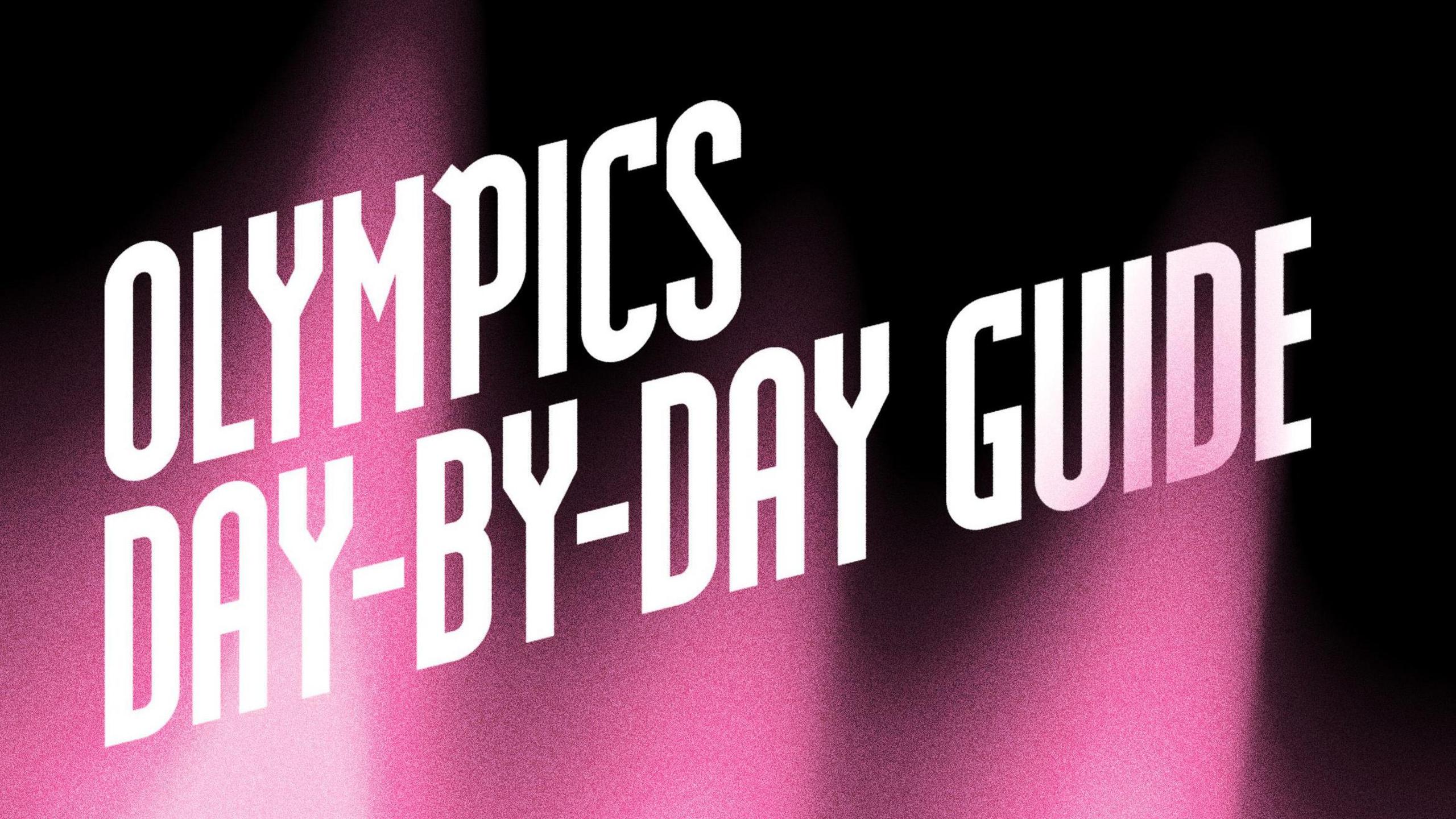
- Published26 July 2024
